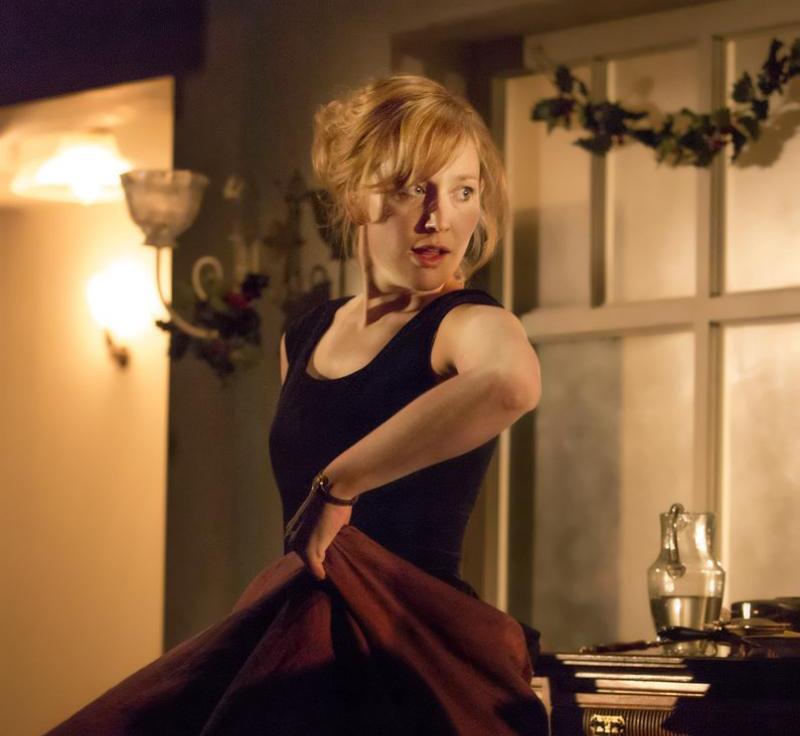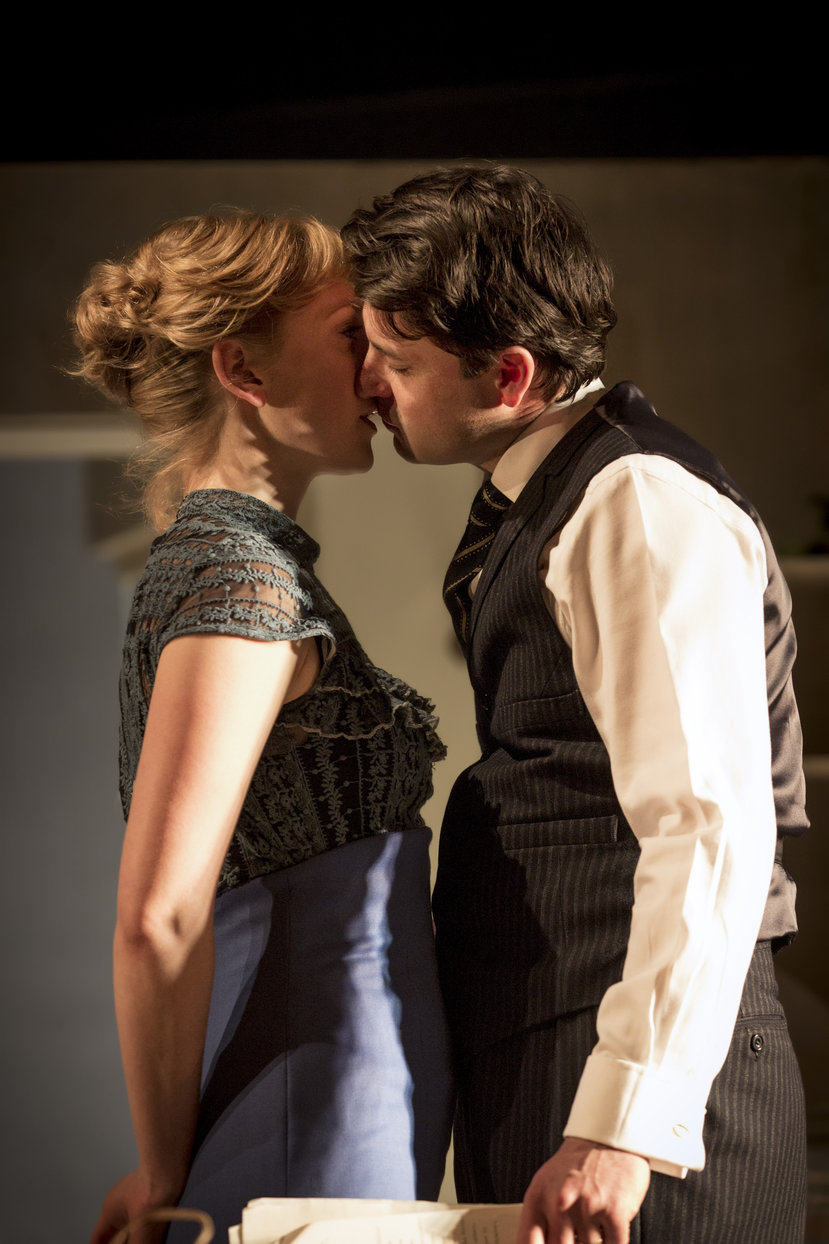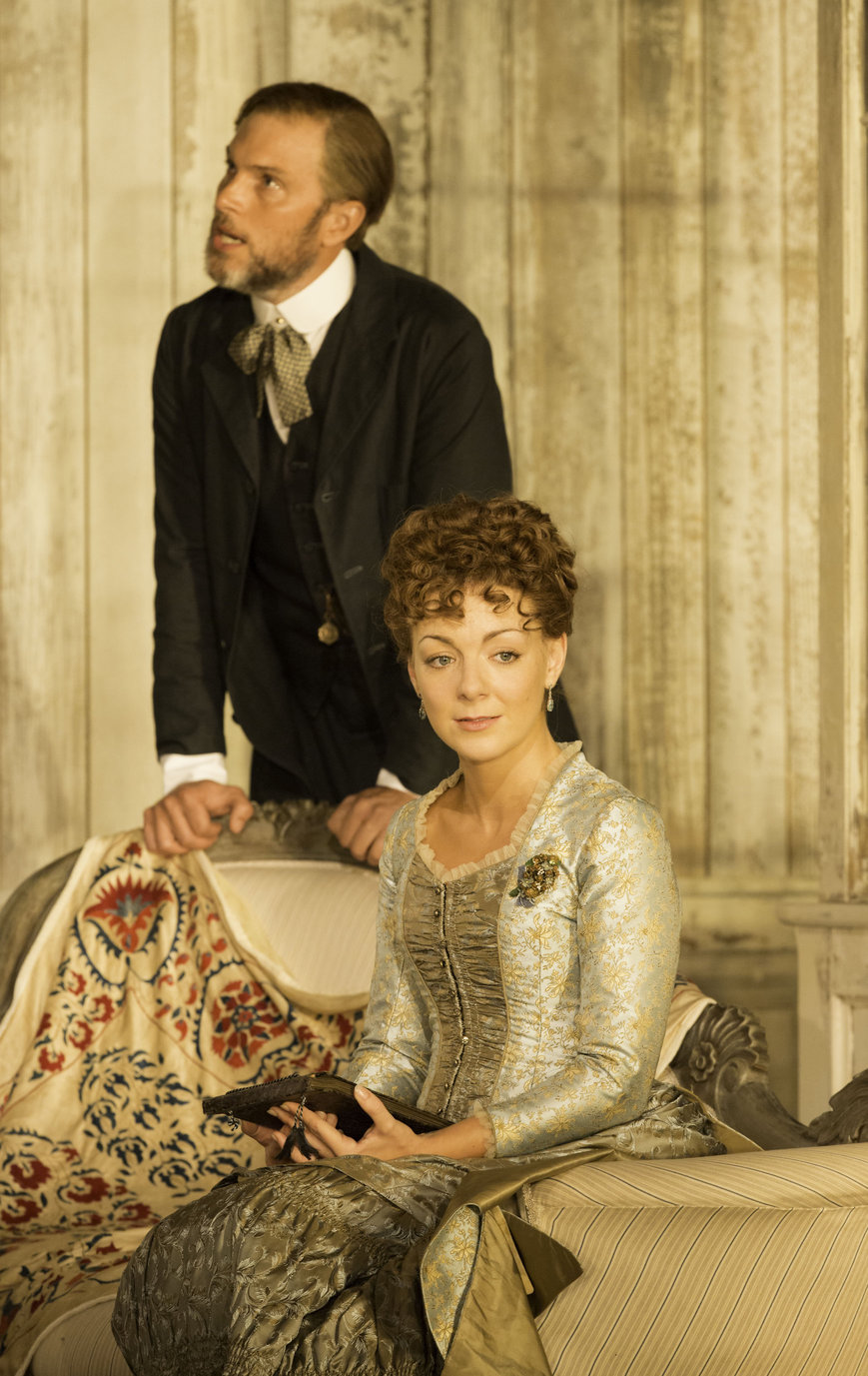A Doll's House, Young Vic | reviews, news & interviews
A Doll's House, Young Vic
A Doll's House, Young Vic
A pretty, period setting yields a perennially contemporary tragedy

The front door of Ibsen’s A Doll’s House may first have slammed shut in 1879, but it’s a sound whose echoes and re-echoes continue to resonate. The crash of feminist selfhood, bursting through the catatonic tranquility of domestic order, originally scandalised 19th-century Norwegian society, but with scandal now rather harder to come by, Ibsen’s play has acquired a quieter, but infinitely more pervasive impact.
Ibsen’s dialogue stretches out freely, finds plenty of room to breathe in Simon Stephens’s new adaptation. Period correctness is never laboured, with Stephens favouring an unobtrusive, timeless language. Both comedy and tragedy come into focus under his gaze, with the neatly-observed humour of Torvald’s drunken, knitting-related small-talk (beautifully handled by Dominic Rowan) offering an insistent emotional counterpoint to the prevailing tension of Act III.
Morahan is exquisitely urgent, simultaneously maddening and beguiling
Ian MacNeil’s set is a revolving picture of charm – Gustavian interiors bathed in the muted shades of Hammershøi and Ilstead. So pretty are the stage pictures that emerge through the narrative rotations of the set – a family silhouetted against the lights of a decorated Christmas tree, two small boys cuddled up for story-time on a big Chesterfield – that it’s with Torvald’s reductive, possessive gaze that we find ourselves looking upon them, willing the action to mirror the demure beauty of its surroundings.
But of course it can’t. Cracknell’s direction sets up a pace that, while never rushed, keeps stride with its restless heroine. The action unfolds as the natural extension of her accelerating thought-process; we arrive, in Hattie Morahan’s reading of Nora, at a spoken conclusion – “That’s why I’m leaving you” – almost before these thoughts catch up, generating a heartbreaking pause between this and her reiteration – “I can’t live with you any longer” – in which we watch her process of realisation.
 Morahan is a breathless, fervent Nora, her instinctual warmth of Act I transforming naturally into the anger of Act III. Exquisitely urgent, simultaneously maddening and beguiling, she flits around MacNeill’s small spaces, her caged energy generating disturbing heat with Rowan’s Torvald. This is a couple whose courtship we can still see in their well-honed role-playing, physical and verbal shorthand shared between them – co-conspirators in this hypocrisy.
Morahan is a breathless, fervent Nora, her instinctual warmth of Act I transforming naturally into the anger of Act III. Exquisitely urgent, simultaneously maddening and beguiling, she flits around MacNeill’s small spaces, her caged energy generating disturbing heat with Rowan’s Torvald. This is a couple whose courtship we can still see in their well-honed role-playing, physical and verbal shorthand shared between them – co-conspirators in this hypocrisy.
Rowan (pictured right with Morahan) excels at quiet villainy, finding out the weakness of a man whose fear of petty social embarrassment sets tragedy in motion. The delicacy of his reading (surviving even the exhaustive bird-imagery of Act I) finds echo in both Susannah Wise’s practical Mrs Linde and Nick Fletcher’s Krogstad – no Dickensian caricature, but a poignant exercise in the banality of desperation. Among so much easy naturalism, only Steve Toussaint’s Dr Rank jars, sitting awkwardly verbally, and dramatically failing to animate this tricky section of sub-plot.
Among so many determined reworkings and adaptations – Sixties settings, politicised Westminster rewrites, all-female casts – Cracknell and Stephens’ quietly faithful treatment offers a far from lazy return to Ibsen’s origins. The same shocking tremors Nora’s front-door slam set in motion in 1879 lose little in returning well over a century later, particularly when animated by performances as truthfully contemporary as we find here in the Young Vic's gilded and gorgeous doll's house.
MORE IBSEN ON THEARTSDESK
Ghosts, Duchess Theatre (2010). Iain Glen makes directorial debut with a straightforward take starring Lesley Sharp
The Master Builder, Almeida Theatre (2010). Passions blow hot and cold in this uneven production starring Gemma Arterton and Stephen Dillane
Emperor and Galilean, National Theatre (2011). Power and pace help to exhume Ibsen's Romano-Christian epic starring Andrew Scott
Judgement Day, The Print Room (2011). Ibsen's last play has its issues but emerges strongly in new adaptation with Michael Pennington
The Lady From the Sea, Rose Theatre, Kingston (2012). Joely Richardson takes on the Ibsen heroine her mother and sister made their own
 Hedda Gabler, Old Vic (2012). Ibsen's heroine draws new depths from the West End's sweetheart Sheridan Smith (pictured)
Hedda Gabler, Old Vic (2012). Ibsen's heroine draws new depths from the West End's sweetheart Sheridan Smith (pictured)
Love's Comedy, Orange Tree Theatre (2012). Early Ibsen finds the playwright in his awkward adolescence
A Doll's House, Royal Exchange (2013). Ibsen in the round loses none of its power to cast a spell
Public Enemy, Young Vic (2013). The horrors of local politics still chime in Richard Jones's queasy production of an Ibsen masterpiece
Ghosts, Almeida Theatre (2013). Richard Eyre and Lesley Manville shine light into Ibsen's dark thriller of family misfortunes
Peer Gynt, Théâtre National de Nice (2014). Irina Brook's song-and-dance Ibsen entertains, but misses the darker shades
The Wild Duck, Belvoir Sydney (2014). Heartbreaking adaptation mixes naturalism and forensic examination
Little Eyolf, Almeida Theatre (2015). Strong women and one weak man in Ibsen's swift study of isolation and guilt
The Master Builder, Old Vic (2016). Ralph Fiennes stars in Ibsen's unsettling mix of the real and the supernatural
Hedda Gabler, National Theatre (2016). Ivo van Hove makes an uneven Southbank debut
The future of Arts Journalism
You can stop theartsdesk.com closing!
We urgently need financing to survive. Our fundraising drive has thus far raised £49,000 but we need to reach £100,000 or we will be forced to close. Please contribute here: https://gofund.me/c3f6033d
And if you can forward this information to anyone who might assist, we’d be grateful.

Subscribe to theartsdesk.com
Thank you for continuing to read our work on theartsdesk.com. For unlimited access to every article in its entirety, including our archive of more than 15,000 pieces, we're asking for £5 per month or £40 per year. We feel it's a very good deal, and hope you do too.
To take a subscription now simply click here.
And if you're looking for that extra gift for a friend or family member, why not treat them to a theartsdesk.com gift subscription?
more Theatre
 Ragdoll, Jermyn Street Theatre review - compelling and emotionally truthful
Katherine Moar returns with a Patty Hearst-inspired follow up to her debut hit 'Farm Hall'
Ragdoll, Jermyn Street Theatre review - compelling and emotionally truthful
Katherine Moar returns with a Patty Hearst-inspired follow up to her debut hit 'Farm Hall'
 Troilus and Cressida, Globe Theatre review - a 'problem play' with added problems
Raucous and carnivalesque, but also ugly and incomprehensible
Troilus and Cressida, Globe Theatre review - a 'problem play' with added problems
Raucous and carnivalesque, but also ugly and incomprehensible
 Clarkston, Trafalgar Theatre review - two lads on a road to nowhere
Netflix star, Joe Locke, is the selling point of a production that needs one
Clarkston, Trafalgar Theatre review - two lads on a road to nowhere
Netflix star, Joe Locke, is the selling point of a production that needs one
 Ghost Stories, Peacock Theatre review - spirited staging but short on scares
Impressive spectacle saves an ageing show in an unsuitable venue
Ghost Stories, Peacock Theatre review - spirited staging but short on scares
Impressive spectacle saves an ageing show in an unsuitable venue
 Hamlet, National Theatre review - turning tragedy to comedy is no joke
Hiran Abeyeskera’s childlike prince falls flat in a mixed production
Hamlet, National Theatre review - turning tragedy to comedy is no joke
Hiran Abeyeskera’s childlike prince falls flat in a mixed production
 Rohtko, Barbican review - postmodern meditation on fake and authentic art is less than the sum of its parts
Łukasz Twarkowski's production dazzles without illuminating
Rohtko, Barbican review - postmodern meditation on fake and authentic art is less than the sum of its parts
Łukasz Twarkowski's production dazzles without illuminating
 Lee, Park Theatre review - Lee Krasner looks back on her life as an artist
Informative and interesting, the play's format limits its potential
Lee, Park Theatre review - Lee Krasner looks back on her life as an artist
Informative and interesting, the play's format limits its potential
 Measure for Measure, RSC, Stratford review - 'problem play' has no problem with relevance
Shakespeare, in this adaptation, is at his most perceptive
Measure for Measure, RSC, Stratford review - 'problem play' has no problem with relevance
Shakespeare, in this adaptation, is at his most perceptive
 The Importance of Being Earnest, Noël Coward Theatre review - dazzling and delightful queer fest
West End transfer of National Theatre hit stars Stephen Fry and Olly Alexander
The Importance of Being Earnest, Noël Coward Theatre review - dazzling and delightful queer fest
West End transfer of National Theatre hit stars Stephen Fry and Olly Alexander
 Get Down Tonight, Charing Cross Theatre review - glitz and hits from the 70s
If you love the songs of KC and the Sunshine Band, Please Do Go!
Get Down Tonight, Charing Cross Theatre review - glitz and hits from the 70s
If you love the songs of KC and the Sunshine Band, Please Do Go!
 Punch, Apollo Theatre review - powerful play about the strength of redemption
James Graham's play transfixes the audience at every stage
Punch, Apollo Theatre review - powerful play about the strength of redemption
James Graham's play transfixes the audience at every stage
 The Billionaire Inside Your Head, Hampstead Theatre review - a map of a man with OCD
Will Lord's promising debut burdens a fine cast with too much dialogue
The Billionaire Inside Your Head, Hampstead Theatre review - a map of a man with OCD
Will Lord's promising debut burdens a fine cast with too much dialogue

Add comment